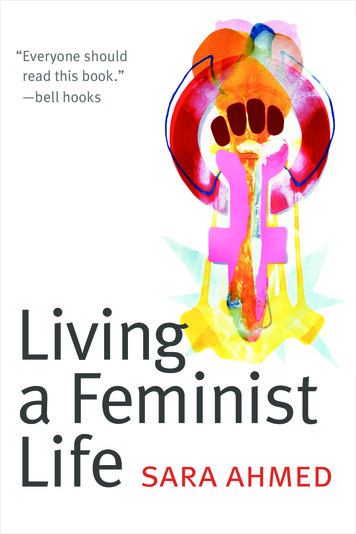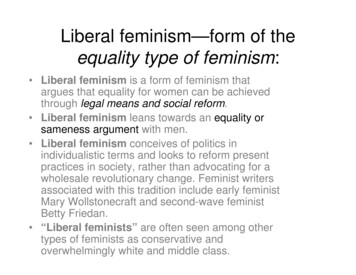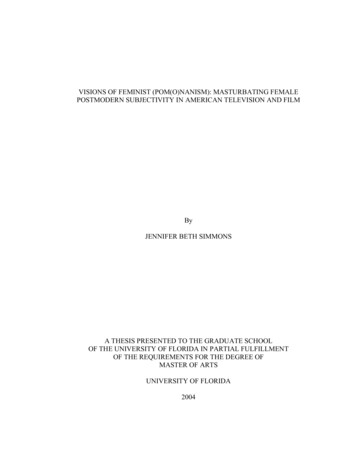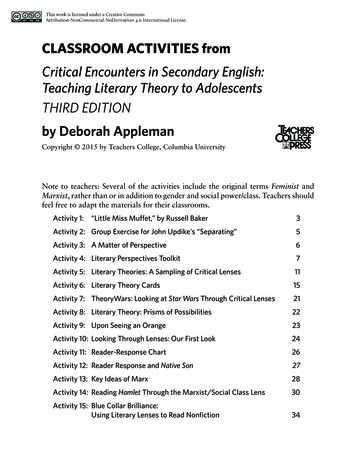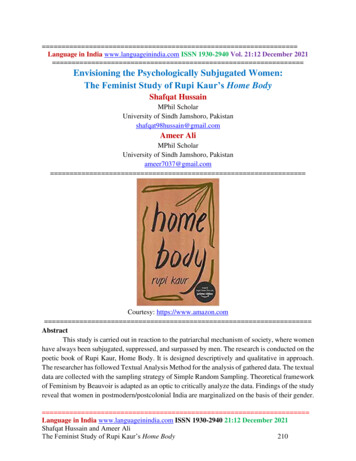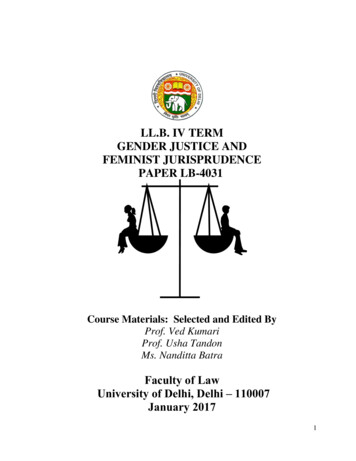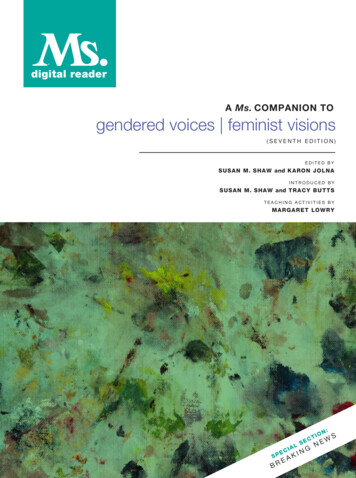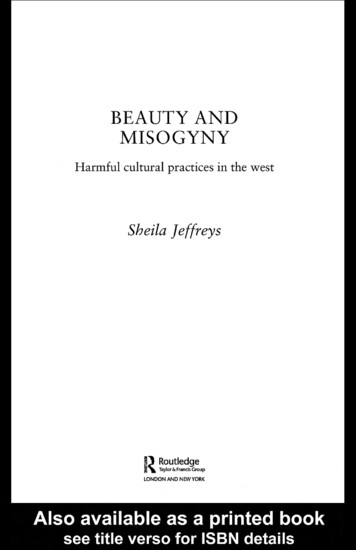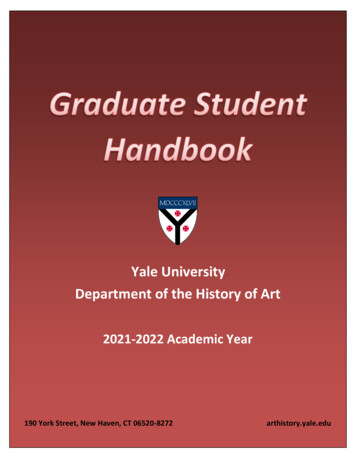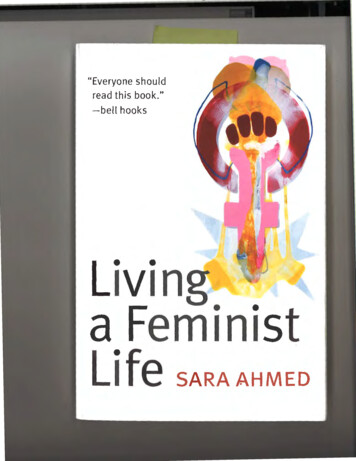
Transcription
"Everyone shouldread this book."-bell hooksa FeministLi e SARA AHMED
You note the connection between the strong arms of the black woman(who has to insist on being woman) discussed in chapter 3 and the strongarms of the butch lesbian (who has to insist on being woman) discussed here.These arms can, ofcourse, belong to the same body 1b.roughout feminist history many women had to insist on being women before they became partof the feminist conversation. Trans women have to insist on being women;trans women often have to keep insisting, again and again, often in the faceofviolent and repeated acts of misgendering; any feminists who do not standup, who do not wave their arms to protest against this misgendering, havebecome the straightening rods. An antitrans stance is an antifeminist stance;it is against the feminist project of creating worlds to support those for whomgender fatalism (boys will be boys, girls will be girls) is fatal; a sentencing todeath. We have to hear that fatalism as punishment and instruction: it is thestory of the rod, of how those who have wayward wills or who will waywardly(boys who will not be boys, girls who will not be girls) are beaten. We needto drown these antitrans voices out, raising the sound of our own. Our voicesneed to become our arms! rise up; rise up.We can make an army connection: if gender norms operate to create a narrow idea of how a female arm should appear, a white arm, a slight arm, an armthat has not labored, an arm that is delicately attuned to an assignment, thenmany who understand themselves as women, who sign up to being women,will be deemed not women because of their arms. It is the arms that leadus astray.Arms not only have a history; they are shaped by history; arms make history flesh. No wonder arms keep coming up. It is the arms that can help usmake the connection between histories that otherwise do not seem to meet.There are many arms; arms that are muscular, strong, laboring arms, arms thatrefuse to be employed, striking arms; arms that are lost in service to the industrial machine; broken arms.lntersectionality is arm.lntersectionality is army.234Chapter 9CONCLUSION 1A Killjoy Survival KitBecoming a killjoy can feel, sometimes, like making your life harder than itneeds to be. I have heard this sentiment expressed as kindness: as if to say, juststop noticing exclusions and your burden will be eased. It is implied that bynot struggling against something you will be rewarded by an increasing proximity to that thing. You might be included if only you just stop talking aboutexclusions. Sometimes the judgment is expressed less kindly: disapproval canbe expressed in sideways glances, the sighs, the eyes rolling; stop struggling,adjust, accept. And you can also feel this yourself: that by noticing certainthings you are making it harder for yourself.But the experiences we have are not just of being worn down; these experiences also give us resources. What we learn from these experiences mightbe how we survive these experiences. Toward the end of chapter 9 I raised thequestion of survival. Here survival is how I begin; it is the start of something.Survival here refers not only to living on, but to keeping going in the moreprofound sense of keeping going with one's commitments. As Alexis PaulineGumbs suggests, we need a "robust and transformative redefinition of survival" ( 2010, 17). Survival can also be about keeping one's hopes alive; holdingon to the projects that are projects insofar as they have yet to be realized. Youmight have to become willful to hold on when you are asked to let goi to letit go. Survival can thus be what we do for others, with others. We need eachother to survive; we need to be part of each other's survival.To be committed to a feminist life means we cannot not do this work; we
cannot not hght for this cause, whatever it causes, so we have to find a wayof sharing the costs of that work. Survival thus becomes a shared feministproject. So this tool kit contains my personal stuff, what I have accumulatedover time; things I know I need to do and to have around me to keep on goingon. We will accumulate different things, have our own stuff; we can peer intoeach other's kits and find in there someone else's feminist story. But I thinkHere through the art oflight description Lorde evokes for us a "those ofus;' athose of us who live and love on the edges of social experiences, in dool"W'ays,the point of the kit is not just what we put in it; it is the kit itself, having somewhere to deposit those things that are necessary for your survival. Feminismis a killjoy survival kit.And then: how we care for ourselves becomes an expression offeminist care.Audre Lorde, as one might expect, helps us to differentiate survival from otherWe could think of this feminist survival kit as a form of feminist self-care.However, to think of a killjoy survival kit as self-care might seem to be a neoliberal agenda, a way ofmaking feminism about the resilience ofindividuals.1 Idiscussed the problem of resilience in chapter 7, the way in which we are askedto become resilient so we can take more (more oppression, more pressure,more work). But this is our problem: feminism needs feminists to survive. Wemight still need to be able to take it, the pressure we are put under when werefuse to take more, when we refuse to put up with a world.Feminism needs feminists to survive: my killjoy survival kit is assembledaround this sentence. It is a feminist sentence. And the reverse too is verytrue: feminists need feminism to survive. Feminism needs those of us wholive lives as feminists to survive; our life becomes a feminist survival. Butfeminism needs to survive; our life becomes a feminist survival in this othersense. Feminism needs us; feminism needs us not only to survive but to dedicate our lives to the survival of feminism. This book has been my expression of my willingness to make this dedication. Feminists need feminismto survive.Audre Lorde, in her extraordinary poem "A Litany of Survival," addressesthose who were "never meant to survive," those for whom survival requirescreativity and work; those for whom survival is politically ambitious. Let meshare a few lines from.this poem:For those of us who live at the shorelinestanding upon the constant edges of decisioncrucial and alonefor those of us who cannot indulgethe passing dreams of choicewho love in doorways coming and goingin the hours behveen dawns (1978, 31)2361Conclusion 1shadows, those of us who fall like shadows fall, the fallen, those for whomcoming into full view would be dangerous, those for whom survival mightrequire not coming out in the full light of day.Survival can be protest.styles of self-orientated politics. Lorde writes, "Caring for myself is not self"indulgence, it is self-preservation, and that is an act of political warfare" ( 1988,131). This is a revolutionary, extraordinary sentence. It is a much-loved, muchcited sentence. It is an arrow, which acquires its sharpness from its own direction. It is from the epilogue to Lorde's A Burst ofLight, a piece ofwriting so profound, so moving, that it never fails to teach me, often by leaving me undone,beside myself ( that's why, as you will read, this book is in my survival kit). Thiswriting is made up of fragments of notes put together as Audre Lorde learnsthat she has liver cancer, that her death can only be delayed, as she comes tofeel that diagnosis in her bones. The expression "a burst oflight" is used whenshe comes to feel the fragility of her body's situation: that inescapable knowledge, in the bone, of my own physical limitation" (Lorde 1988, 121).A Burst ofLight is an account ofhow the struggle for survival is a life struggleand a political struggle. A death sentence is not only about what Jasbir Puar( 2009) has called "prognosis time": it is not (or not only) about experiencingyour death as imminent. When you are not supposed to live, as you are, whereyou are, with whom you are with, then survival is a radical action; a refusalnot to exist until the very end; a refusal not to exist until you do not exist. Wehave to work out bow to survive in a system that decides life for some requiresthe death or removal of others. Sometimes: to survive in a system is to survivea system. Some of us have to be inventive, Audre Lorde suggests, to survive.Others: not so much.When a whole world is organized to promote your survival, from health toeducation, to the walls designed to keep your residence safe, to the paths thatease your travel, you do not have become so inventive to survive. You do nothave to be seen as the recipient of welfare because the world has promotedyour welfare. The benefits you receive are given as entitlements, perhaps evenas birthrights. This is why I describe privilege as a buffer zone; it is how muchyou have to fall back on when you lose something. Privilege does not mean weA Killjoy Survival Kit
are invulnerable: things happen; shit happens. Privilege can however reducethe costs of vulnerability; you are more likely to be looked after.Racial capitalism is a health system: a drastically unequal distribution of bodily vulnerabilities. Ruth Wilson Gilmore describes racism thus:"the state-sanctioned or extra-legal production and exploitation of groupdifferentiated vulnerability to premature death" ( 2007, 28). Being poor, beingblack, being of color puts your life at risk. Your health is compromised whenyou do not have the external resources to support a life in all ofits contingencies. And then of course, you are deemed responsible for your own ill health,for your own failure to look afteryourselfbetter. vVhen you refer to structures,to systems, to power relations, to walls, you are assumed to be making othersresponsible for the situation you have failed to get yourself out 0 "You shouldhave tried harder:' Oh, the violence and the smugness of this sentence, thissentencing.A health system is also a support system. The more precarious you are, themore support you need. The more precarious you are, the less support youhave. Vvhen we say something is precarious, we usually mean it is in a precarious position: if the vase on the mantelpiece were pushed, just a little bit, a littlebit, it would topple right over. 2 That position-ofliving on the edge-is whatis generalized when we speak ofprecarious populations (see Butler 201 s), Living on the edge: a life lived as a fragile thread that keeps unraveling; when lifebecomes an effort to hold on to what keeps unraveling.Vvhen I think of this, I think of how fragility as an effort to hold on canbecome more revolting; how fragility can be militancy.1hroughoutA Burst ofLight Audre Lorde compares her experience of battling with cancer (and she iswilling to use this militaristic language; she is willing to describe this situationas war) to her experience of battling against antiblackracism. The comparisonis effective, showing us how racism can be an attack on the cells of the body,her body, her black body, an attack on the body's immune system; the way inwhich your own bod/experiences what is outside itself as inside itself; deathfrom the outside in. A world that is against you can be experienced as yourbody turning against you. Th.is is why for Lorde caring for oneself is not selfindulgence but self-preservation. It is rebellious to fight for life when you havebeen given such a deadly assignment.In this statement that caring for oneselfis not self-indulgence we can thushear a defense. Audre Lorde is defending self-care. What from? From whom?From, one might suspect, those who dismiss caring for oneself as an indul-Conclusion 1gence. Self-indulgence tends to mean being soft on one's self, but also canmean yielding to one's inclinations. Recently I have heard much feministwork being dismissed on these terms. Feminism: too soft, too safe, too focused on identity politics or individual suffering. Feminist student activismin particular has been dismissed like this: safe spaces, trigger warnings, selfcare, all taken up as evidence of being coddled and weak. One thing I knowfrom working in universities: student movements might be teaching us howattending to fragility, the histories that render some more fragile than others,can be a source of militancy.And yet Audre Lorde could be read as a critic ofself-care. After all, she gaveus a strong critique of how structural inequalities are deflected by being madethe responsibility ofindividuals (who in being given the capacity to overcomestructures are assumed to fail when they do not overcome them). Her workexplores how caring for oneself can become a technique of governance: theduty to care for one's self is often w-ritten as a duty to care for one's own happiness. In The Cancer Journals she shows how making our own happiness ourfirst responsibility can be how we turn away from injustice. Lorde asks, "WasI really fighting the spread of radiation, racism, woman-slaughter, chemicalinvasion ofour food, pollution ofour environment, and the abuse and psychicdestruction of our young, merely to avoid dealing with my first and greatestresponsibility to be happy?" ( 1997, 76). Audre Lorde has given us the answerto her question.We have something to work out here. Audre Lorde writes persuasivelyabout how caring for oneselfcan lead you away from engaging in certain kindsof political struggle. And yet, in A Burst of Light (1988), she defends caringfor oneself as not about self-indulgence but self-preservation. She is makingfor us a distinction. She is sharpening a tool. This kind of caring for oneself isnot about caring for one's own happiness. It is about finding ways to exist ina world that makes it difficult to exist. This is why, this is how: those who donot have to struggle for their own survival can very easily and rather quicklydismiss those who attend to their own survival as being self-indulgent. Theydo not need to attend to themselves; the world does it for them.For those who have to insist they matter to matter, self-care is warfare. Wecould think here of #blacklivesmatter, a movement with a hashtag; a hashtagcan be snap; a movement begun by black feminist and queer activists AliciaGarza, Patrisse Cullors, and Opal Tometi to protest against how black lives donot matter, how black deaths are not mourned, how injustices against blackA Kilyoy Survival Kit239
people are not recognized. Mattering for some requires and involves collectiveagency: "Black Lives Matter affirms the lives of black queer and trans folks,disabled folks, black undocumented folks1 folks with records, women and allblack lives along the gender spectrum. 3 You have to affirm that some livesmatter when a world is invested in saying they do not.Protest can be a form of self-care as well as care for others: a refusal notto matter. Self-care can also be those ordinary ways we look out for eachother because the costs of protesting are made so high, just as the costs thatlead to protest remain so high. In directing our care toward ourselves, we areredirecting care away from its proper objects; we are not caring for those weare supposed to care for; we are not caring for the bodies deemed worth caring about. And that is why in queer, feminist, and antiracist work, self-care isabout the creation ofcommunity, fragile communities as I explored in part III,assembled out of the experiences of being shattered. We reassemble ourselvesthrough the ordinary, everyday, and often painstaking work of looking afterourselves; looking after each other.We need a handle when we lose it. A killjoy survival kit is about finding ahandle at the very moment one seems to lose it, when things seem to fly outof hand; a way of holding on when the possibility you were reaching for seemsto be slipping away. Feminist killjoys: even when things fly out of hand, evenwhen we fly out of hand, we need a handle on things.ITEM 1: BOOKSYou need your favorite feminist books close to hand; your feminist booksneed to be handy. You need to take them with you; make them with you.Words can pick you up when you are down. And note: it is often books thatname the problem that help us handle the problem. Kick-ass feminist bookshave a special agency, a11 of their own. I feel propelled by their kick.Books in my tool kil include Sister Outsider, A Burst of Light, Zami, andThe Cancer Journals by Audre Larde; Feminist Theory and Talking Back by bellhooks; The Politics of Reality by Marilyn Frye; Gender Trouble, Bodies ThatMatter, and Precarious Lives byJudith Butler; Mrs. Dalio way by Virginia Woolf;The Mill on the Floss by George Eliot; Rubyfruit Jungle by Rita Mae Brown. Yes Iknow this list includes a lot of books by Audre Lorde and Judith Butler. Theirwords reach me. Their words teach me.Wherever I go, they go.Co11clusion 1iTEM 2: THINGSA feminist life too is surrounding by things. Living a feminist life creates feminist things. We all have tendencies; we might be a feminist hoarder, keep everylittle poster, button, scrap ofpaper from a meeting; or we might not. But thinkof how a convention is a thing maker (the wedding photographs, the signsof a reproductive life that can gather like weights on walls). "\Ve need to havethino-stoo·I things that o-atheraround, reminders of a feminist life, happy ob00jects even, reminders of connections, shared struggles, shared lives. We mighthave more or fewer things, but a feminist needs her things.Surround yourself with feminism. In a conversation with Gloria Steinem,bell hooks describes how she surrounded herself with her precious objects,feminist objects, so that they are the first things she sees when she wakes up,4Think of that: you create a feminist horizon around you, the warmth of memories; feminism as memory making. Feminism too leaves things behind. Thingscan also be how you handle what you come up against: you are reminded whyyou are doing what you are doing. Things are reminders.Our feminist politics makes things as well as breaks things.JTEM 3: TOOLSA survival kit is also a feminist toolbox. What are your feminist tools? fvlineinclude a pen and a keyboard, a table; the things around me that allow me tokeep writing, to send my words out. Maybe a survival kit is also a toolbox. Weneed to have things to do things with; a killjoy needs more tools, the more sheis up against. Maybe she uses her computer to write a blog. A tool: a meansto a killjoy end. The blog itself becomes a tool; it is how she can extend herreach; how she can find a community of killjoys. A feminist end is often a newmeans. We need more means available the harder it is to achieve our ends. Weneed to diversify our tools, expand our range; we need to become more andmore inventive, because so often when we do one thing, we find ourselvesblocked. She has to keep going when she is blocked; she can pick herself upagain by picking something else up, maybe something she finds nearby. Ofcourse, then, a feminist killjoy approaches things as potentially useful things,as means to her own ends. She has a use for things. She might not be usingthings the way she is supposed to. She might queer use or find a queer use forthings. Her killjoy survival kit, to fulfill the purpose for which it is intended,.{ Killjoy Survival Kit1241
will itself become another useful thing. But hand that survival kit to another,and it might not be quite so useful. In fact: a killjoy survival kit might evenbe deemed as compromising the health and safety of others. In fact: a killjoysurvival kit might be deemed useless by others.A feminist tool is sharp; we need to keep sharpening our tools. When wespeak, we are often heard as sharp. Hear her: shrill, strident, the killjoy voice.A voice can be a tool. And yet somehow sharp can become blunt. One persononce turned this bluntness into an insult, describing me as not the sharpesttool in the house [of being]. I tum the insult into a willful aspiration: to makefeminist points requires being willing to be blunt. My own citation policy inthis book is a case in point.In my previous chapter I described lesbian feminism as willful carpentry.So yes we need feminist carpenters, feminist builders; we need to make feminist buildings by not using the master's tools, as Audre Lorde notes, most willfully, by proclaiming unflinchingly that the master's tools will never dismantlethe master's house. We might need feminist tools to make feminist tools. Wecan become tools; we can become bricks, feminist bricks.Of course, sometimes a feminist has to go on strike. To strike is to put yourtools down, to refuse to work by working with them. A feminist sometimesrefuses to work, when the conditions ofworking are unjust. A tool can be whatshe puts down when she is striking.JTEM 5: LIFEThere is so much in life, as we know, things that are ordinary or just there, beautiful things, to love; those things that come and go; things that are all the morevaluable because they are fragile. Being a killjoy is too occupying, if it takes youaway from the worlds you are in; the rise and fall of the sun, the way the treesare angled like that, the smile of a friend when you share a joke, the cold freshwater; the feel of the sea as immersion; the familiar smells of spices cooking.Twice in my life an animal has come into my life and made life feel morepossible, made life vibrate with possibility: when I was twelve, it was Mulka,a horse who was with me for almost thirty years (I mentioned him in chapter 2), always there even when we were living on separate continents. Mulkasaved my life, of that I am sure, helped me to find another path when I washurtling toward a miserable fate. He brought with him a world, a world ofhorsey people, in the Adelaide hills, a world apart from school and family. Hebrought with him Yvonne and Meredith Johnson, who in caring for him whenI was away, cared for me. And then there was Poppy, our puppy, who cameDid your heart quicken when you read that e-mail? Did your fingers quickeninto my life while I was writing this book. It is the first time I have shared a lifewith a dog. She makes everything better. She brought with her so much, sointent on the task of being herself; a bounding presence who keeps me in thepresent. She wiggled her way into my affections. She also wiggled her way intothis survival kit. She will wiggle right out again. Of that too, I am sure.To survive as to be: to be with Mulka; to be with Poppy; to be in a present;to be out in the world; to be alive with a world.Life matters; we are killjoys because life matters; and life can be what kill-when you typed that response, as if driven by the force of your own rage? Doyou have a sense that this is happening to you, and that you are caught byjoys are fighting for; life requires we give time to living, to being alive, to beingthrown into a world with others. We need to be thrown by how others arehap, and shudder because of what happens? Whatever you decide, whetherto send something, or not, say something, or not, pause, breathe; take sometime. Slow down. Frown."You might still send it, but you will be glad you havegiven yourselfroom to decide; you will be glad.Tirne also means having time out. Even when you have willingly acceptedthe killjoy assignment, you are more than this assignment. Take breaks; dothrown. We need to be unsettled by what is unsettling. We need to let life in, inall of its contingencies. I think of this as being open to hap.And, as I suggestedin chapter 8, to affirm hap is a kind of snap; we snap a bond that decides for usthe kind of shape a life should have to count as a good life. But that does notmean breaking our bond to life. To snap a bond is for life. We believe in life allthe more when we have to struggle for life, whether we have to snap, becauseother things, with things. Time out might be required for time in.Time out from being a killjoy is necessary for a killjoy if she is to persistwe have to struggle to exist or struggle to transform an existence.Being involved in a life project is affirmative. That is what those of us as-in being a killjoy. Being a killjoy is not all that you are, and if you are too consumed by her, she can drain too much energy and will. Come back to her; shewill come back to you: you will, she will.signed killjoys know too well; yes we are assigned negative, but in being willing to receive that assignment we are affirming something. We might haveITEM Le: TIME242Conclusion 1different words, names, for this something.A Killjoy Survival Kit243
ITEM 6: PERMISSION NOTESThere is only so much you can do. I have in my killjoy survival kit some permission notes to step back when it is too much. I noted in chapter 7 that you canlearn to choose your battles wisely, but battles can also choose you. You don'talways know when you can or will use your permission notes even when youhave given them to yoursel But the mere fact of having them there, as a wayyou give yourself permission to exit a situation, can make the situation morebearable. You can leave; you can grieve.I have already described how I left my academic post. I resigned because Igave myselfpermission to resign. That's not the only reason. But you need to beable to leave a situation, whether or not you do leave that situation. Being able toleave requires material resources, but it also requires an act ofwill, of not beingwilling to do something when it compromises your ability to be something.I also have in my kit some sick notes. Do you anticipate that an event ormeeting will be compromising? Do you feel you will be upset without beingable to do anything? Well, put some sick notes in your kit. Use them sparingly,but given that we can be sick from the anticipation of being sick, the notesexpress a political as well as persona.I truth. Of course that is not to say thatwhat we anticipate will happen will happen; of course not. But sometimes,just sometimes, we are not willing to take that risk. Be willful in your not willingness. Always.ITEM 7: OTHER KILLJOYSI think other killjoys are an essential part of my killjoy survival kit. 1 know itmight sound odd to put other people in a place you have designated as yourspace (in a bag, I keep thinking of bags; how can we breathe in bags?). But Icannot think of being a killjoy without the company of other killjoys. This isnot about identity; itis not about assuming a community of killjoys (I havediscussed the problem with making this assumption). Rather, it is about theexperience of having others who recognize the dynamics because they toohave been there, in that place, that diflicult place. This is not to say we cannotbecome killjoys to killjoys. We can and we do. And that is just one more reasonthat other killjoys need to be part of our survival kit. It helps us to recognizehow we too can be the problem; we too can be involved in erasing the contributions or chances of others.I learned this lesson recently when my own participation in a conversationConclusion Jon black British feminism ,.vas challenged by black women who saw me as participating in their erasure from public spaces and discussions. I responded tooquickly and became defensive, hearing their voices as part of the same chorus of what I would call more questionable critiques that positioned brownwomen as gaining position by taking up places that did not belong to them,which used the familiar narrative that women of color use diversity as a careeradvancement. I heard as a killjoy. And that stopped me from hearing killjoys,those who were getting in the way ofwhat I thought ofas a lifeline: black British feminism as my intellectual community. Staying close to other killjoys isthus not about being on the same side. It is how we can ask more of ourselves;it is how we can be and stay vigilant.Our crossness can and should be directed toward ourselves. We get thingswrong. I did. And I do.ITEM 8: HUMORA close kin of the :figure of the feminist killjoy is the figure of the humorlessfeminist: the one who cannot or will not get the joke; the one who is miserable. Oh the proximity of kinship! Ofcourse, we refuse to laugh at sexist jokes.We refuse to laugh when jokes are not funny. I consider this point to be so vitalthat it forms the fourth of the ten principles of my killjoy manifesto. But wedo laugh; and feminist laughter can lighten our loads. In fact we laugh often inrecognition of the shared absurdity of this world; or just in recognition of thisworld. Sometimes we make jokes out of the points left severed, the bleedingarteries of our institutional knowledge. Sometimes we laugh with each otherbecause we recognize that we recognize the same power relations.What I am implying here: lightening our loads becomes part of a killjoysurvival strategy. When we are dealing with heavy histories, lightening becomes a shared activity. When we are dealing with norms that tighten themore we fail to inhabit them, making it difficult to breathe, loosening becomesa shared activity. Part of the work of lightening and loosening is sharing: because diversity work is costly, we have to share the costs ofdoing that work.My interviews with diversity practitioners that I drew on in part II werethus full oflaughter. Like the time a diversity practitioner talked about how shejust had to open her mouth in meetings to witness eyes rolling asifto say, "Ohhere she goes." How we laughed as killjoys recognizing that killjoy moment.Or like the time a diversity practitioner told me of how a friend asked, "Arethey related?" about a photo of her (all white male) management team. HowA Killjoy Survival Kit245
we laughed, at that moment, at that exposure of how instih1tions work as kinship structures. When we catch with words a logic that is often reproduced bynot being put into words, it can be such a relief We recognized that each otherrecognized the logic. Laughter, peals ofit; our bodies catching that logic, too.We don't always laugh, ofcourse. Sometimes we have to let the full weightof a history bear down on us
the point of the kit is not just what we put in it; it is the kit itself, having some where to deposit those things that are necessary for your survival. Feminism is a killjoy survival kit. We could think of this feminist survival kit as a form of feminist self-care. However, to think of a killjoy survival
